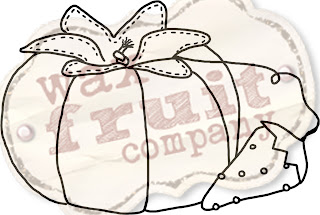I do a lot of what I call "digital" paper~piecing for different projects. I use digital patterned papers (mostly from digital scrap kits) to "color" my digital images, instead of traditional coloring. It's not very difficult, as long as you have the right tools.
I use Photoshop (pricey) and Photoshop Elements (little less than $100 - but VERY worth it!). You can also do it using Gimp, a free downloadable photo editor, much like Photoshop. Today I'm using Pixlr, a free online editor that is VERY much like Photoshop - as a matter of fact, you can pretty much use this same tutorial if you're working in Photoshop or Photoshop Elements. You can find Pixlr at http://pixlr.com/. The only drawback to this program that I can see, is that you MUST SAVE YOUR WORK AFTER EACH STEP! The screen went blank a couple times while I was putting this tutorial together, and I had to start over.
When you pick an image to work with, pick one that has "enclosed" areas. By this I mean, the lines of the drawing touch, so that the areas you are trying to fill with the digi patterned paper are completely surrounded by the lines of that area. The image below, Mama's Pincushion from the Wax Fruit Company, has enclosed areas, so I'll be using it.

You can click on any of these thumbnails to enlarge them and get a better view!
Ready? Here we go!
1 - When you first go to Pixlr, you'll see this screen, click "Open Image from Computer" and then pick the image you want to use. Here I opened Mama's Pincushion.
See the box on the right hand of the screen labeled "Layers"? Every time you paste something into the document, it will place it on a new layer. You can click on the individual layers to "work" in that layer.
2. - Select the layer your image is on (there should only be one right now), and with your cursor over the layer, right click your mouse. Once you do this, your window will look like the one below. Click "Duplicate Layer". And now you'll have 2 layers of the same image. The top layer is the one I'll be working with & the bottom one is there in case I mess up! (that way you don't have to open it again!)
Now SAVE your image to your desktop, and then we'll continue.
3. - Now go to "File" and click "Open Image". Here I opened a digital paper from Material Girl by Cosmo Cricket, found at Jessicasprague.com.
4. - After your paper file opens, go to "Edit" and click "Select All". Then click "Edit" again and select "Copy".
5. - Now click on the window that has your digi on it, go to "Edit" and choose "Paste". Now your paper is in the document with your digi, on the top layer. Left click on that layer, and while holding the button down, drag the layer until it's under the one beneath it.
Now SAVE your image again.
7. - Now for the F-U-N!!! Click on the top layer, the one with the digi image on it. On the left of the screen is a vertical bar of "Tools". In the left column, third from the top is the "Wand". Yes, it IS magic! It selects areas that are all the same color. (This is why it's important that your image has enclosed areas... any openings and it will select more than you want!) After you click on the "Wand", you can click on the areas you want to "color" with your digi paper. Once selected, they will have a dotted line running around them. (If you hold down the "Shift" key while you select, it allows you to select multiple areas at once.)
8. - Once the area is selected, hit "Delete" or "Backspace" and the area will disappear to reveal your digi paper underneath. Now go over to your top Layer (the one you've been working with that has your image on it) and right click. Select "Merge Down". This merges the digi image layer with the patterned paper layer.
Now SAVE your image again.
REPEAT steps 3-8 with different papers, saving after each addition.
Once you've "colored" your image the way you like it, save it one last time.
WooHooooo!!! You just "digitally paper~pieced" an image!!! I hope it was easy to understand, but if not, please don't hesitate to email me for clarification!
The next tutorial will show you how to use this technique with images that don't have enclosed areas - so stay tuned!!!
Bye for now!
















